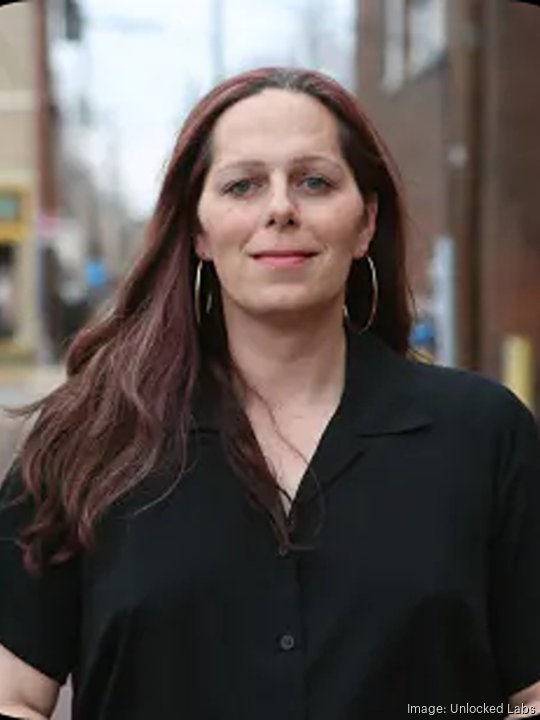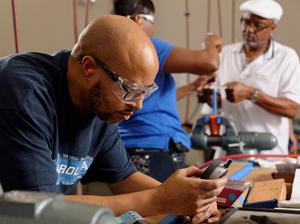
St. Louis-based Unlocked Labs is one of nine companies nationwide, and the only one from the Midwest, to win a $100,000 grant from the New York-based Robin Hood anti-poverty nonprofit's AI Poverty Challenge to incorporate artificial intelligence into its educational platform for incarcerated people.
Unlocked Labs will now compete for $1 million in funding from Robin Hood, which established the competition through a partnership with the GitLab and Bezos Family foundations.
Robin Hood chose nine finalists out of 200 applicants in 21 states to advance in the competition, which is focused on combating poverty through artificial intelligence and machine learning. The other eight finalists are all from either New York, California or Washington, D.C.
Unlocked Labs is currently offering artificial intelligence-powered smart tutoring to around 6,000 incarcerated users in 13 prisons, partnering with Washington University, the State University of New York, Cornell University, Arizona State University and the non-profit Hudson Link for Higher Education in Prison.
Correctional services in Maine, Missouri and New York are piloting Unlocked Labs' services and programming. The nonprofit has a working relationship with the Computational Policy Lab at the Harvard Kennedy School Shorenstein Center on Media, Politics and Public Policy, which has developed an artificial intelligence program, PingPong, for Harvard University itself.
The Robin Hood funding will enable Unlocked Labs to continue building its educational platforms, which cover adult education, anger-management, financial literacy and more.
"Getting all those skills into a single platform is the first thing we start with," Unlocked Labs co-founder Co-Executive Director Jessica Hicklin said. "That's what our platform does. It's open-source, it's designed for prisons, it's designed to bring access to a multitude of learning opportunities, to incarcerated folks."
The artificial intelligence component enables users to ask for help on curriculum. PingPong is built on top of GPT-4o, a large language model developed by OpenAI, and enables moderators to view how students are using the tool and tailor content. Information students enter into PingPong is not used to train models, ensuring data privacy. PingPong is also integrated into Canvas, the student-teacher software common in educational settings.
Hicklin said the Computational Policy Lab is working with her organization pro bono, and Unlocked Labs is not paying licensing costs as it folds PingPong into its learning platform.
In institutions like Sing Sing Correctional Facility north of New York City, students can use Unlocked Labs' technology in computer lab settings; for WashU's program, students use laptops that can connect to the internet in their classrooms but not in cells, though they can access content there, too.
Calculating progress
Unlocked Labs started three years ago, and Hicklin said there isn't enough longitudinal data yet to assess its programs' efficacy. But students have earned associate's degrees with the nonprofit's platform, and more than 100 users are in post-secondary degree programs. Unlocked Labs also has a coding program in Missouri that has put 230 people through a workforce development program.
"We have a lot of real-world success," Hicklin said. "One of the guys came out of our program and went to work for a block-chain company. Seventy percent of the people who work for me at Unlocked Labs came out of incarcerated spaces into our program and now are employed as software engineers."
The U.S. Department of Justice released an analysis of recidivism rates in 24 states last year that concluded that 82% of those released from state prisons were rearrested at least once during the 10 years following release. Hicklin noted research linking access to education in prison with a substantial reduction in the likelihood that incarcerated people will be arrested again once released.
"Right now in this country, we're spending $187 billion a year on corrections, but most of that money is going to electric fences, punishment mechanisms and underpaid staff," she said. "We're working with all of the stakeholders, not just some of them, to figure out how we reinvest the money that we're already spending."
Building post-prison prospects
Hicklin was imprisoned for 26 years, beginning when she was 16. She said the fear of being out of prison but without a means of making an honest living is a reason why formerly incarcerated people end up going back to prison.
"When I left prison, I didn't have a single formal educational experience in that entire time. The State of Missouri spent $700,000 incarcerating me, and not a single dollar went to ensuring I had the opportunities I needed to be successful coming home," she said. "And the problem is, that's the norm."
Hicklin said Unlocked Labs may look for a guidance counselor-type of artificial intelligence platform, which would allow users to ask questions about their options when they are no longer incarcerated. The nonprofit reported $1.88 million in revenue last year, $625,000 in expenses and $1.45 million in total assets.
Richard R. Buery, Jr. CEO of Robin Hood, praised Unlocked Labs and the eight other $100,000 grant winners in a statement.
“This challenge represents a new frontier of hope as we explore how machine learning and the AI revolution can be a force fueling upward mobility," he said. "Our finalists have been through a rigorous scoring and review process administered by a panel of 100 judges selected for their areas of expertise, including people who have experienced poverty and those who support them. We are excited to see how the work of the finalists evolves in the months and years to come.”










